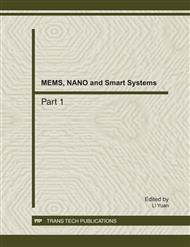[1]
P. Greiff, B. Boxenhorn, T. King, L. Niles, Silicon monolithic micromechanical gyroscope, 1991 International Conference on Solid-State Sensors and Actuators, Digest of Technical Papers, pp.966-968, (1991).
DOI: 10.1109/sensor.1991.149051
Google Scholar
[2]
N. Yazdi, F. Aayzi, K. Najafi, Micromachined Inertial Sensors, Proceedings of the IEEE, vol. 86, no. 8, pp.1640-1659, Aug (1998).
DOI: 10.1109/5.704269
Google Scholar
[3]
K. Shcheglov, C. Evans, R. Gutierrez, T.K. Tang, Temperature dependent characteristics of the JPL silicon MEMS gyroscope, 2000 IEEE Aerospace Conference Proceedings, vol. 1, pp.403-411, (2000).
DOI: 10.1109/aero.2000.879420
Google Scholar
[4]
M.I. Ferquson, D. Keymeulen, C. Peay, K. Yee, D.L. Li, Effect of temperature on MEMS vibratory rate gyroscope, 2005 IEEE Aerospace Conference, Big Sky, MT, United states, March 2005, doi: 10. 1109/AERO. 2005. 1559561.
DOI: 10.1109/aero.2005.1559561
Google Scholar
[5]
A.A. Trusov, A.R. Schofield, A.M. Shkel, Performance characterization of a new temperature-robust gain-bandwidth improved MEMS gyroscope operated in air, Sensors and Actuators: A Physical, vol. 155, no. 1, pp.16-22, Oct (2009).
DOI: 10.1016/j.sna.2008.11.003
Google Scholar
[6]
G.J. Liu, A.L. Wang, T. Jiang, J.W. Jiao, J. -B. Jang, Effects of environmental temperature on the performance of a micromachined gyroscope, Microsystem Technologies, vol. 14, no. 2, pp.199-204, Feb (2008).
DOI: 10.1007/s00542-007-0411-4
Google Scholar
[7]
B. Zhou, R. Zhang, Zh.Y. Chen, Online self-compensation for enhanced the scale factor stability of a micromachined gyroscope, Journal of Physics: Conference Series, vol. 188, no. 1, p.012043, (2009).
DOI: 10.1088/1742-6596/188/1/012043
Google Scholar
[8]
C.C. Painter, A.M. Shkel, Structural and thermal modeling of a z-axis rate integrating gyroscope, Journal of Micromechanics and Microengineering, vol. 13, no. 2, pp.229-237, March (2003).
DOI: 10.1088/0960-1317/13/2/310
Google Scholar
[9]
Q. Shi, R. Zh. Ding, Y. Su, A.P. Qiu, Device-level vacuum packaging of silicon microgyroscopes, Journal of Mechanical Engineering, vol. 45, no. 2, pp.243-246, Feb 2009, (in Chinese).
DOI: 10.3901/jme.2009.02.243
Google Scholar
[10]
R.T. M'Closkey, A. Vakakis, Analysis of a Microsensor Automatic Gain Control Loop, Proceedings of the 1999 American Control Conference, vol. 5, pp.3307-3311, (2009).
Google Scholar
[11]
C.T. -C. Nguyen, R.T. Howe, An integrated CMOS micromechanical resonator high-Q oscillator, IEEE Journal of Solid-State Circuits, vol. 34, no. 4, pp.440-455, April (1999).
DOI: 10.1109/4.753677
Google Scholar
[12]
C. -K. T. William, Electrostaic comb drive for resonant sensor and actuator application, University of California, Berkeley, (1990).
Google Scholar
[13]
J. Qian, CH. Liu, D. CH. Zhang, Residual stresses in micro-electro-mechanical systems, Journal of Mechanical Strength, vol. 23, no. 4, pp.393-401, 2001, (in Chinese).
Google Scholar
[14]
Y. Okada, Y. Tokumaru, Precise determination of lattice parameter and thermal expansion coefficient of silicon between 300 and 1500K, Journal of Applied Physics, vol. 56, no. 2, pp.314-320, July1984.
DOI: 10.1063/1.333965
Google Scholar


